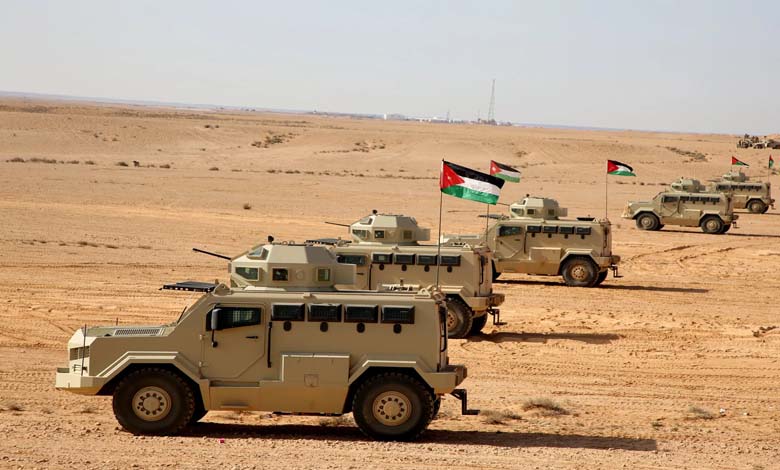Jordan rules out any military role in Gaza and the West Bank

The Jordanian government has reaffirmed its firm stance against any form of military participation in Gaza or the West Bank, emphasizing that its role in the future of the besieged enclave must be political, humanitarian, and focused on reconstruction—not military involvement.
-
Trump announces the start of Phase Two of the plan to end the Gaza war: pathway and obstacles
-
Hamas and the Muslim Brotherhood: A Persistent Security Threat to Europe
Government spokesperson Mohammed Al-Moumani made this position clear in a televised interview on Friday evening, stating: “We will not send Jordanian forces to Gaza, nor will we have any military role in the West Bank or Gaza. What we support is an end to the war, the entry of humanitarian aid, and a credible political process that leads to reconstruction.”
His remarks draw a clear line between Jordan’s regional priorities—centered on peace and long-term stability—and the international security arrangements currently being discussed as the ceasefire takes effect.
-
Symbols and Sketch… Israel Publishes a Paper Found in Sinwar’s Pocket
-
Cabinet meeting without a truce… escalation in Gaza and annexation plans in the West Bank
The statement followed an announcement by the Jordanian Armed Forces that Amman would appoint a representative to the newly established Civil-Military Coordination Center (CMCC) in Gaza, created by the U.S. Central Command (CENTCOM). The CMCC, staffed by around 200 U.S. soldiers and international experts, aims to facilitate humanitarian coordination and security stabilization efforts in the Strip.
Jordan’s position makes it clear that its participation will remain strictly humanitarian and civil in nature, rejecting any notion that it could evolve into a broader military engagement.
-
Israel launches the first stages of its offensive on Gaza City and rules out any humanitarian pause
-
Political Analyst: Israel’s Starvation Policy in Gaza Is a Full-Fledged War Crime
Al-Moumani reiterated that the Palestinian people have the right to self-determination, stressing that “forced displacement and violations of Jerusalem’s holy sites are red lines that cannot be crossed.”
He criticized Israel’s recent annexation policies in the West Bank, describing them as “aggressive,” and expressed Jordan’s appreciation for U.S. and international efforts opposing these measures. He clarified that Jordan’s position goes beyond military nonparticipation—it is a comprehensive political stance advocating for the establishment of an independent Palestinian state.
Al-Moumani also affirmed that Jordan’s humanitarian operations for Gaza will continue unabated, noting that “the aid and relief efforts provided by Jordan are a source of pride for every Jordanian and for the Arab world.”
-
Growing international opposition to Israel’s plan to occupy Gaza
-
Hungry in Gaza: When Chaos Devours the Loaf of Life
He concluded by reaffirming Amman’s commitment to supporting Gaza, saying, “We will never delay in providing all possible assistance to our brothers and sisters in Gaza.”
Jordan’s rejection of a military role contrasts with U.S. Secretary of State Marco Rubio’s recent optimism about several countries’ readiness to contribute to an international stabilization force in Gaza.
This optimism comes amid ongoing efforts to sustain the ceasefire between Israel and Hamas, which came into effect on October 10, and to begin implementing the second phase of the Trump peace plan.
-
Slanders and Lies About Jordan… What Are the Brotherhood’s Aims?
-
Gaza Crisis: Agreement on an Independent Committee and Security Training in Cairo
Rubio stated that the international force should be composed of “countries that Israel feels comfortable with,” adding that “several nations have already offered to participate.” The twenty-point peace plan, approved by both Israel and Hamas on October 9, calls for the creation of a “temporary international stabilization force” in Gaza to train and support an approved Palestinian police force.
Rubio confirmed that all parties had agreed to exclude Hamas from Gaza’s future governance and that the United States, in coordination with the United Nations if necessary, is working to establish the conditions required for the force’s deployment.
-
Diplomacy Chasing a Rush toward Catastrophe in Gaza
-
Egyptian Initiative to Convince Washington on Gaza Reconstruction Plan
He expressed optimism that the ceasefire would hold, despite recent Israeli airstrikes that killed 45 Palestinians following the deaths of two Israeli soldiers.
In this context, Jordan’s stance serves as a balancing voice, reaffirming that true stability can only be achieved through politics, reconstruction, and the lifting of the blockade—not through temporary military arrangements.












